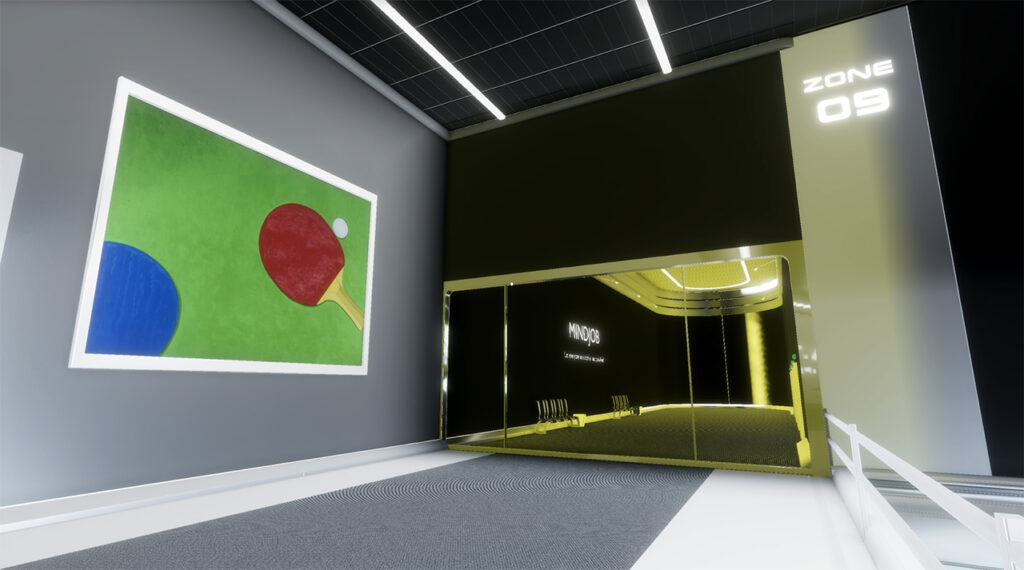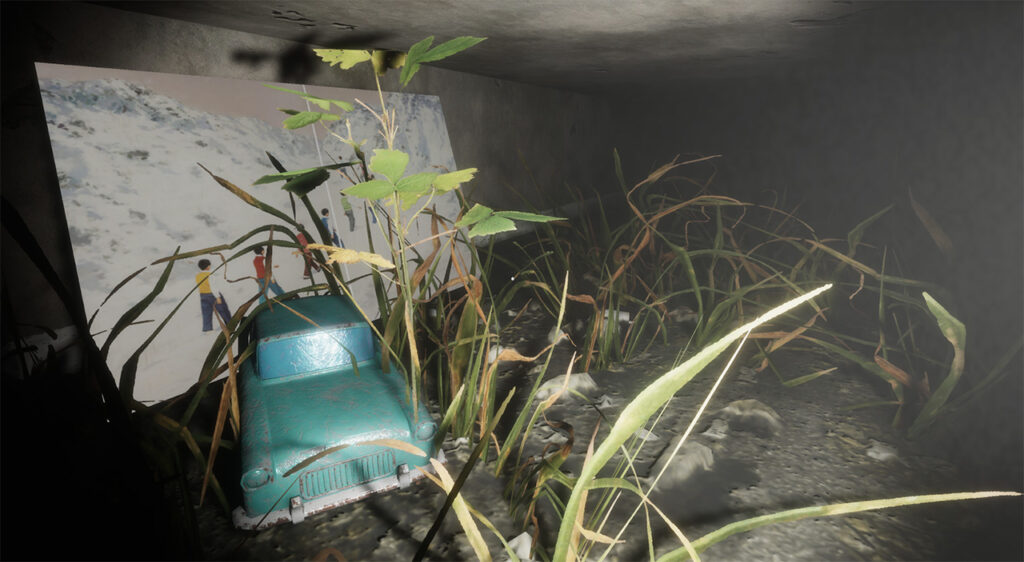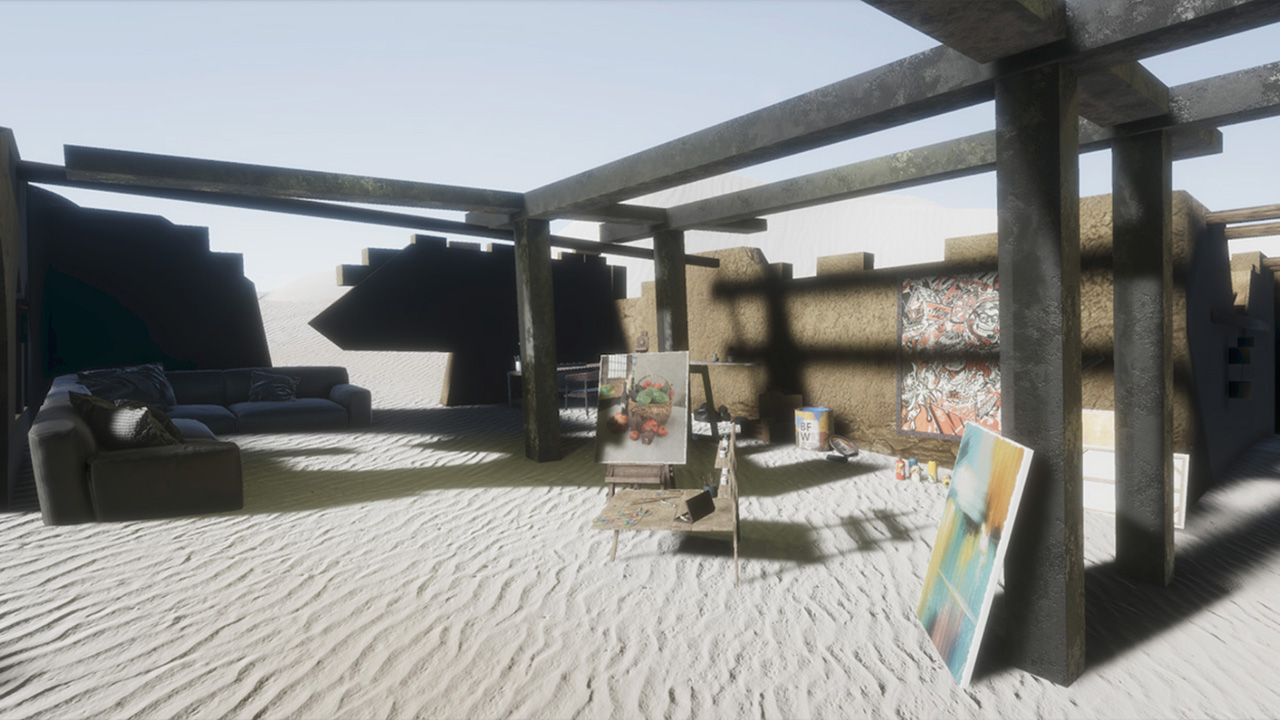What’s Picasso with no Guernica, a Jimi Hendrix who escaped cycles of addiction, the Virginia Woolf that overcame crippling depression? Untangling artists from trauma and artwork from inner demons is a flawed endeavor divorced from reality, which makes it an ideal hypothetical for a video game to tackle.
The Forgetter imagines a future in which the world’s über-rich want creativity for their offspring without the aforementioned burdens of artistic genius. Enter MindJob, the dystopian company behind an artist-brain recycling technology that offers creativity purchasable for download — CRISPR, anyone?
A first-person psychological smash game, players (aka hired forgetters) are tasked with roaming deceased artists’ minds and destroying all traces of traumatic episodes, objects of distress, and abusive individuals, and then cleaning up the debris. Yes, a vacuum cleaner is provided.

MindJob, a fictional company within the game’s universe, recruits and trains players, known as forgetters, in its patented “artist-brain recycling technology.” Image: The Forgetter
It’s the brainchild of Hong Kong-based game designers, Alan Kwan and Yang Jing, and became a reality through a collaboration with the dslcollection, a collection of contemporary Chinese art that is nomadic, centered on digital, and was launched by French couple Sylvain and Dominique Levy in 2005. As forgetters explore artist memories, they encounter paintings and videos from the collection, some of which they may be required to destroy. But don’t worry, as the game kindly reminds us, real artwork is too valuable; you’re just destroying memories of art.
Beyond posing players fundamental questions about artistic creation (and destruction), the game connects with dsl’s mission to embrace technological transformation, and redefine who an art audience is and how best to engage them. Dsl launched on YouTube in 2005, created a virtual reality museum to house 30 XXL artworks in 2016, and found a place in Second Life’s online virtual world. These reimaginings draw dsl closer to audiences that co-founder Sylvian Levy believes now prioritize experience over contemplation — a two-decade process of “Kusama-ification,” as he labels it.
“I want dsl to be a timeless platform for big ideas. After VR, a video game was naturally the next step,” says Levy, noting the project gained new urgency as the pandemic forced the art world onto screens big and small. “From my experience, the people who know how to use the screen in terms of emotion and interactivity are coming from video games.”

MindJob’s new hires are tasked with ridding clients’ minds of traumatic episodes, represented by works of art. Image: The Forgetter
For game designer Yang, the goal is to capture audiences outside of the art world by writing compelling storylines that draw from her community of artist friends. “The artists I know are dwelling on one or two things that are deep and personal,” she says. Artworks from dsl are selected to connect with a level’s theme — such as aging, degradation, loneliness, isolation — but the focus is ultimately less on watching art and more on encouraging immersion and interactivity. She’s certainly taken solace watching play testers obliterate father figures, works of art, and chairs without a moment’s hesitation. With the help of Steam’s algorithms, the leading video game digital distribution service, Yang hopes The Forgetter can find a niche but sizable audience that enjoys story-rich, independently created romps.
Recent months have seen once-traditional cultural institutions embrace elements of gaming, the Getty Museum gave players of Nintendo’s Animal Crossing access to its collection and the Metropolitan Museum of Art collaborated with Verizon on a gamified AR mobile experience. Where The Forgetter differs is in creating a standalone product divorced from the traditional art world, which, as Levy stresses, is not a gimmick.
“dsl can model a new type of experience that can open the door to a very large community, much larger than the community of museum audiences today. Perhaps it’s a door to a new type of revenue, a new type of entertainment.”
And Yang’s next idea? Art theft. She imagines a game in which players break into the homes of contemporary art collectors and must swiftly discern between priceless artworks and worthless pieces of junk before trying their luck on the black market. You sense dsl might just be interested.
The Forgetter will be released on Steam in March 2021.



